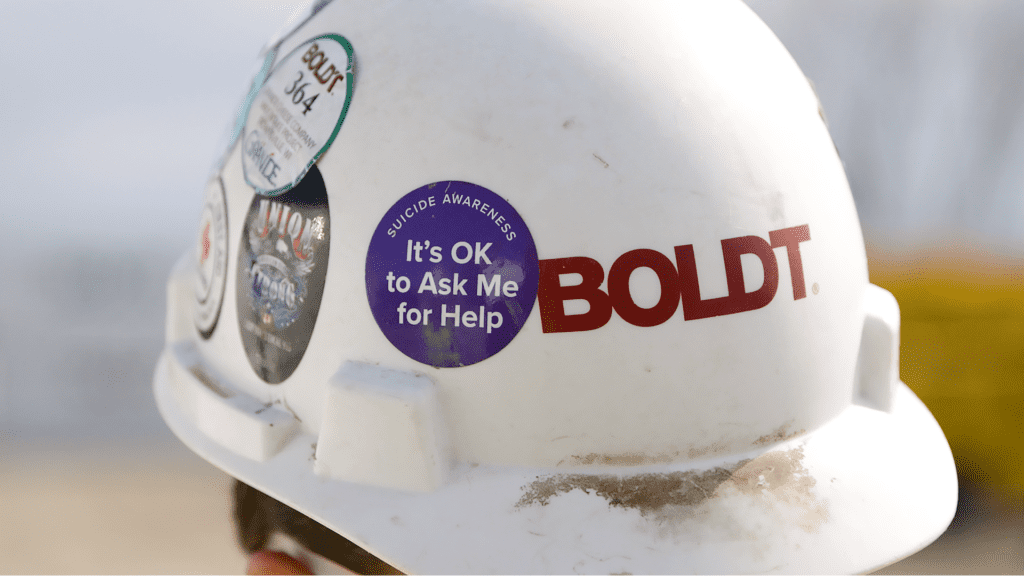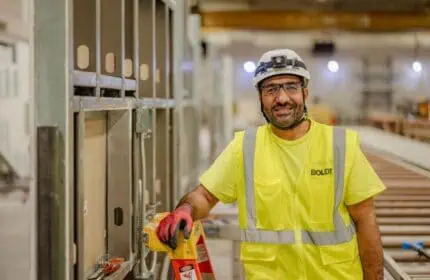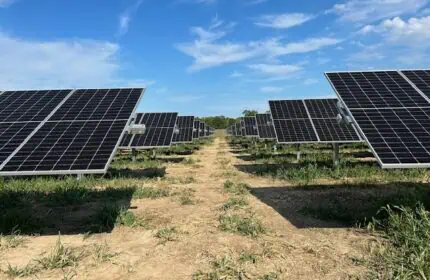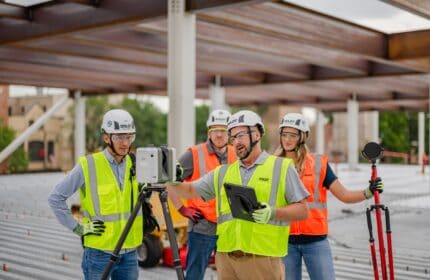Blog
Trained Volunteer Gatekeepers Offer Peer-to-peer Help

Boldt’s Gatekeeper program provides peer-to-peer assistance on the job
In response to the alarming statistics, The Boldt company implemented a suicide awareness and prevention program in 2021 using peer-to-peer “gatekeepers” to provide help and referrals for co-workers. Today, 88 trained gatekeepers are at jobsites and offices nationwide. They are clearly identified by purple stickers on hardhats, computer terminals, and desks and are ready to listen to team members in crisis.
Suicide is the leading cause of construction fatalities and suicide rates in the construction industry are four times the national average. According to studies by the Centers for Disease Control, suicide rates in the U.S. working population increased 34% from 2000-2016 and is the leading cause of violent death for men in the construction industry.
“Mental health is a huge crisis within the construction industry,” said Holly Lifke, chief human resources officer and executive vice president for Boldt. “We’re hearing positive reactions from employees who see the sticker on a hard hat or on the window of an office and know there’s someone they can talk to.”
Question. Persuade. Refer.
Peer gatekeepers go through ongoing training to equip them with resources and referrals when talking with co-workers. Gatekeepers have resources provided by the QPR Institute which stands for the basic steps of suicide prevention training: question, persuade, and refer. Gatekeepers are trained in identifying the warning signs of suicide and knowing how to help by referring individuals to mental health professionals.
“The gatekeeper isn’t going to be your therapist, the gatekeeper is going to be your peer resource for you to have an initial conversation,” said Renee Wolf, health coach at Boldt. She adds the stigma surrounding mental health is more acute in the male-dominated construction industry but knowing there’s a platform for a confidential, open discussion can be a positive first step.
Construction puts a strain on employees
Rochelle Isaacson works in Boldt’s national power & industrial division and sees first-hand the strain construction puts on employees.
“A lot of guys don’t want to talk about it. But out in the field there’s a brotherhood and hopefully they’ll open up to their peers. You’re there as a sounding board. You’re not a professional, but you can get them help.”
“People may not realize our craft travels across the country–that means they are leaving behind a spouse, parents, children and going far away to do the good work Boldt does,” Isaacson said. “But traveling for long periods of time, doing physical labor, working in a demanding environment with deadlines is challenging and a gatekeeper program tunes us into these work environments.”
Talking openly about mental health issues can save lives
Bob Arndt is a job site superintendent who sees the physical labor, tight deadlines, and specialized equipment the mostly male workforce manages every day. He was motivated to be a gatekeeper when his fiancée’s father committed suicide after a life spent working in construction. In his experience, talking openly about mental health issues can save lives.
“A lot of guys don’t want to talk about it,” Arndt said. “But out in the field there’s a brotherhood and hopefully they’ll open up to their peers. You’re there as a sounding board, you’re not a professional, but you can get them help.”
Like Arndt, Rochelle Isaacson lost loved ones to suicide which prompted her to be a gatekeeper. She’s quick to say challenges might not only be about suicide, but the more open the workplace is to discuss mental health issues the healthier everyone will be.
“We are allowed to care about each other. Boldt has given us that permission through this program,” Isaacson said.
Boldt team members can access traditional health benefits through the company’s insurance program and have access to an employee assistance program (EAP). The ongoing challenge for the gatekeeper program will be to ensure there are enough team members willing to be identified by the purple sticker showing they are available to help.
“Everyone has struggled at one or more points in their life, and I would argue that the person who has the courage to come forward and ask for help is the person who shows strength,” Lifke said.
For more information on suicide in the construction industry, visit https://preventconstructionsuicide.com/.
SEE MORE COVERAGE
Construction Superintendent News
About The Boldt Company
The Boldt Company (Boldt) is a leading professional construction services firm with customers across the United States and is a subsidiary of The Boldt Group. Founded in 1889, Boldt is a fourth-generation family and employee-owned firm headquartered in Appleton, Wisconsin. Boldt is recognized as a pioneer in Lean construction and in the industrialized construction space. Boldt operates 18 offices across the U.S. that serve customers in healthcare, power, industrial, education, automotive and commercial markets.


